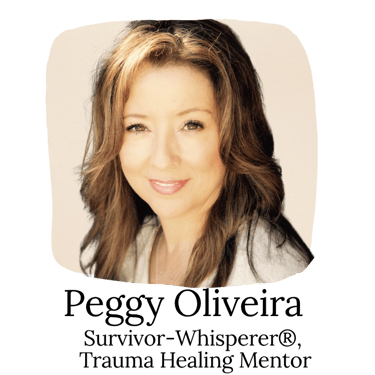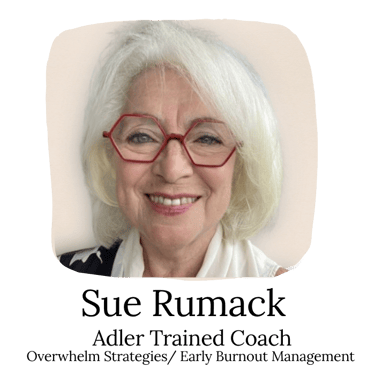Ep 1: The 3 Hidden Reasons Helping Professionals Burn Out (And Why Your Self-Care Isn't Working)
You Did Everything Right. And You’re Still Falling Apart.
BEFORE YOU WALK AWAY
6 min read



Podcast Experts:
Part 1: You Came to Heal Others Because You're Still Bleeding
Peggy Oliveira - Trauma Therapist & Survivor Mentor / MSW / Founder, Courageous Journeys® Podcast & Retreats / Author & Speaker Guiding Women to Wholeness
SharRon Jamison - Life Strategist & Entrepreneur / Founder, The Jamison Group / Inspirational Speaker & Minister / Author – I Can Depend on Me, I Have Learned a Few Things / MBA, Biopharma Leader
Sue Rumack - Adler‑Trained Coach / Overwhelm & Early Burnout Specialist for Therapists / Founder, CourageousPath.com / Empath Support & Divorce Identity Rebuilder / Author & Workshop Leader
Taniya: "I've been a social worker for three decades, and I've met lots of social workers who've had such traumatic pasts. That's what brought them in to do the work because by healing others, they want to heal themselves.
Some of them witnessed extensive, really horrible domestic violence, some of them have been sexually abused, some of them emotionally abused, but yet the work that social workers and healthcare professionals do sometimes numbs us, numbs you and me to our own pain."
Peggy: "We go into this to help heal ourselves as well, and unfortunately, many of us haven't really taken the time to look at what part of the way that we've been and really take the years that it takes to continue to intentionally work on healing those wounds.
In order to show up every day for everybody else, we have to put our own stuff aside. We have to put it away to be fully present and do the work that we do.
While it allows us to show up in that way, they're all there, and so not only are we still not fully healed from our own stuff, but we're so easily affected by the stuff that we see and experience every day with our clients. No matter what that looks like, it doesn't have to be the same thing that we experience. It can be totally different, but the struggle, if the emotions are similar, if the fear is similar, then it reminds us on a very cellular level of our own wounding that still hasn't been able to fully heal."
Sue: "That's what secondary trauma is. Client after client who comes in over the course of one day, it's like energy being thrown at a wall. Some of it's going to stick. The mud sticks and more mud sticks and more mud sticks. After a time, it's as if that therapist now has a mud wall around them. Their own healing energy can't get out to help this person and other people's energy can't get in to help the therapist.
So the therapist gets stuck inside themselves."
The Energy Wall That Traps You
SharRon: "Sometimes you hear stories that are so beyond your comprehension, that just to hear the stories starts to invoke fear in your soul. For example, when I hear stories of people who've been gang raped, it's like, oh my God. And it's hard to remain objective in that sense when your sensibilities are assaulted.
When you feel that human beings have gone beyond what it means to be human to each other and degrade each other and dehumanize each other in such a way that you cannot get that thought out of your head. You're shocked, you're surprised, and when you feel people who have gone through, who have been brutalized, you can't just intellectualize that away. You can't not act like, after you see something, you cannot unsee it.
I am amazed at the human ability to deal with pain. But just think, they're only dealing with their pain. I have 30 people, and they've just been powered up that I became an emotional dump. They didn't mean to do that; I just didn't know how to digest it. "
When You Can't Unsee What You've Seen
Sue: "In my journey in working with therapists, I've discovered that they are so at risk of absorbing the secondhand stress of their clients. And it's so invisible. And it does statistically impact the length of their career and the quality of their life."
SharRon: "I think that I started to sink and started having very suicidal thoughts. I think one of the things about our work, we have this, I call it secondhand trauma, that has a way of making you feel heavy and you wear it. And so since I didn't know how to metabolize or digest other people's pain, I just piled it up and piled it up and I started sinking.
In the midst of all of this transition and trauma and all this insomnia, I stopped understanding where I stopped and where somebody else has started. I started violating my own boundaries, but I didn't know that. And because it was so incremental and it was so insidious that I did not understand that I had started to sink.
My sinking was just not something that started over a year. It was probably a 15-year process, lower and lower and lower. But because when I would sink, it would become my new norm, I didn't think about it.
When it got to the point where I could no longer function, where I was suicidal and I couldn't take care of my son, when I started really feeling that life was too heavy, I was in trouble. "
Part 2: When Your Stories Become Your Nightmares
I had enough awareness intellectually to know I needed help, but emotionally I didn't know how to pull myself through that dark place.
I knew I was stuck, I just didn't know how to unstick myself.
-Sharron Jamison
Sue: "Compassion fatigue is the slippery slope that leads people down into burnout. And while you'll be at the top, sometimes not feeling so bad and then you'll dip again. Each time you dip a little further until finally you're spiraling down into a funnel that leads to burnout.
Compassion fatigue adds to workplace anxiety, where you begin to get overwhelmed with the processes, the paperwork, the demands of your managers, and the demands of your clients. And the burnout piece of it basically says you begin to feel that your career is failing you. That's number one. The second one is you begin to feel that your training is failing you. Then you begin to feel that your confidence is failing you, right? And then you begin to feel that you're failing your clients.
You feel that your anxiety is actually getting the upper hand then you begin to feel that you're failing your family. And the last thing is you begin to feel that you're failing yourself and that's when your identity really becomes compromised and it becomes very difficult for you to continue without taking a very long break. That's burnout."
Taniya: "And this happens, we do know of social workers, doctors, healthcare professionals, teachers, a lot of these people that are just such givers.
The Spiral Down
Taniya: "There's a part of you that kind of gets so used to it and then there's another part of you that, like you said, you start feeling it in your body. You get physical illnesses, you get irritable bowel syndrome or you have high blood pressure or you have heart problems or you get diabetes.
And this is something that I, as a coach, sometimes hear lots of coaches say:
You need to get out of your comfort zone. And for social workers who majority of their life have been surrounded by not just their own trauma, but other people's trauma, they've surrounded by crisis, panic, chaos. That is their norm.
And I sometimes think it's like being okay, and being all right and being comfortable with joy and happiness and stability. And that's sometimes what we find hard."
Part 3: Your Nervous System Thinks Peace Is Danger
Sue: "Therapists and other helping professionals, social workers, etc. The people who are most affected by compassionate fatigue are our most gifted and talented and giving people. The helpers, the healers and they are the ones that overcommit on their time, overcommit in volunteering, overcommit with everybody because they know that they can help them.
Those of us who are in the helping professions, somehow even though we don't, we're not egotistical about the work that we do, we do have a certain belief in ourselves that we are somehow above the same trauma that affects our clients. Somehow we've managed to protect ourselves from it. Somehow our knowledge in having become the profession that we are has somehow safeguarded us and put us beyond being at risk."
The Dangerous Myth of Professional Immunity
The Truth About Why Traditional Self-Care Fails Helpers
Next episode: What it costs to keep showing up for everyone... except yourself.
Subscribe at dancingwithdarknessbook.com
Sue: "We follow absolutely the self-care toolbox that we were given which is we exercise, we eat right, we don't over indulge in bad things, we meditate, we do yoga, we pray, we go for therapy when we need therapy and somehow we still end up at the end of the day with aches and pains that our doctors cannot diagnose, with stomach ailments that cannot be helped by medicine, dizziness and nausea first thing in the morning and we're not pregnant, we might even be male, not wanting to get on bed in the morning and feeling like we want to quit our profession."
"So our current self-care toolbox, while it is the regimen that we've been trained to follow, is failing us. There is another toolbox and that toolbox really is learning how to work with that energy barrier that surrounds you."
Why Meditation and Boundaries Aren't Enough
Dancing With Darkness
A transformative journey from darkness to light.
© 2025. All rights reserved.